
Orthoptists investigate, diagnose and treat disorders of binocular single vision (e.g. squints) and problems relating to reduced vision. This may be due to amblyopia (lazy eye) and/or the need for glasses.
Orthoptists are also involved in assessing for abnormal eye movements caused by a nerve palsy, injury to the eye or diseases affecting the muscles in the eye. Patients with eye movement problems often complain of diplopia (double vision).
The work includes:
- Assessing babies and small children for defects of vision including children with special needs
- Treating adults with double vision associated with other conditions such as diabetes, thyroid disorders, neurological conditions e.g. multiple sclerosis
- Ensuring speedy rehabilitation of patients who have suffered stroke and acquired brain injuries and have vision problems.
Further Resources
www.nystagmus.org (uncontrolled movement of the eyes)
www.lazyeye.org (Amblyopia)
Social story to print and show your child before coming to hospital.
Good to See You – My First Visit to the Orthoptist Video
Education
- University of Liverpool –
- A Day In The Life…
-
- View another “A Day In The Life of” Video
- An Interview with University of Liverpool – Orthoptics Ambassadors
- Glasgow Caledonian University –
- BSC (Hons) Orthoptics Course
Video Resources




